初中英语无生试讲教案
初中英语无生试讲教案

初中英语无生试讲教案一、教学目标1. 知识目标:(1)学生能够掌握本课的生词和短语。
(2)学生能够理解并运用本课的主要句型进行交流。
(3)学生能够听懂并朗读本课的对话或短文。
2. 能力目标:(1)学生能够通过pr work和group work等形式进行有效的口语交流。
(2)学生能够运用本课所学知识进行简单的写作。
3. 情感目标:(1)学生能够积极参与课堂活动,提高学习英语的兴趣。
(2)学生能够通过学习英语,增强自信心和自主学习能力。
二、教学内容1. 生词和短语:列出本课的生词和短语,并进行解释和例句展示。
2. 主要句型:介绍本课的主要句型,并进行例句展示和练习。
3. 对话或短文:朗读并翻译本课的对话或短文,解释其中的难点。
三、教学过程1. 热身活动:通过唱英文歌、做游戏等方式,引导学生进入英语学习状态。
2. 生词和短语学习:引导学生通过看图片、找规律等方式记忆生词和短语。
3. 主要句型学习:通过例句展示和练习,让学生掌握本课的主要句型。
4. 对话或短文学习:朗读并翻译对话或短文,讲解其中的难点。
5. 课堂活动:组织pr work和group work等活动,让学生运用所学知识进行口语交流。
6. 写作练习:根据本课的主题,给出写作话题,让学生进行简单的写作练习。
四、作业布置1. 抄写本课的生词和短语。
2. 背诵本课的主要句型。
3. 完成课后练习题。
五、教学反思在课后,对本次课堂的教学效果进行反思,分析学生的学习情况,找出存在的问题,并提出改进措施,以提高教学质量。
六、教学评估1. 课堂参与度:观察学生在课堂活动中的参与情况,了解学生的学习兴趣和积极性。
2. 口语表达:评估学生在pr work和group work等活动中口语表达的准确性和流利度。
3. 写作能力:通过课后作业和课堂练习,评估学生的写作能力和应用所学知识的能力。
七、教学资源1. 教材:使用指定的教材,并根据学生的实际情况进行适当的调整和补充。
初中英语无生上课面试教案

初中英语无生上课面试教案课时:1课时年级:八年级教学目标:1. 能听懂、会说、会读本课的生词和重点句子。
2. 能用所学的句型介绍学校的外观和设施。
3. 能运用所学知识进行简单的情景交际。
教学内容:1. 生词:sports ground, library, laboratory, schoolbag, school uniform2. 重点句子:- How does your school look?- It looks nice/beautiful/modern.- What's in the school?- There is a sports ground/library/laboratory/...- Do you like your school?- Yes, I do./No, I don't.教学过程:Step 1: Lead-in1. Greeting: Hello, everyone. Nice to meet you. How are you?2. Introduce the topic: Today, we're going to talk about our school. Does anyone want to show us your school?Step 2: Presentation1. Introduce the new words: sports ground, library, laboratory, schoolbag, school uniform. Show pictures and ask students to guess the meaning.2. Teach the sentences: How does your school look? It looks nice/beautiful/modern. What's in the school? There is a sports ground/library/laboratory/... Do you like your school? Yes, I do./No, I don't.3. Ask students to practice the sentences with their partners.Step 3: Practice1. Ask students to write a short passage about their school using the new words and sentences.2. Choose some students to read their passages and ask the others to guess which school they are talking about.Step 4: Consolidation1. Ask students to role-play a conversation between two students introducing their school to a new student.2. Encourage students to use the new words and sentences in their conversation.Step 5: Summary1. Ask students to summarize what they have learned in this lesson.2. Teacher gives feedback and encourages students to study hard.Step 6: Homework1. Write a composition about your school.2. Review the new words and sentences.教学评价:1. 观察学生在课堂上的参与程度和口语表达能力。
初中英语教案模板无生试讲
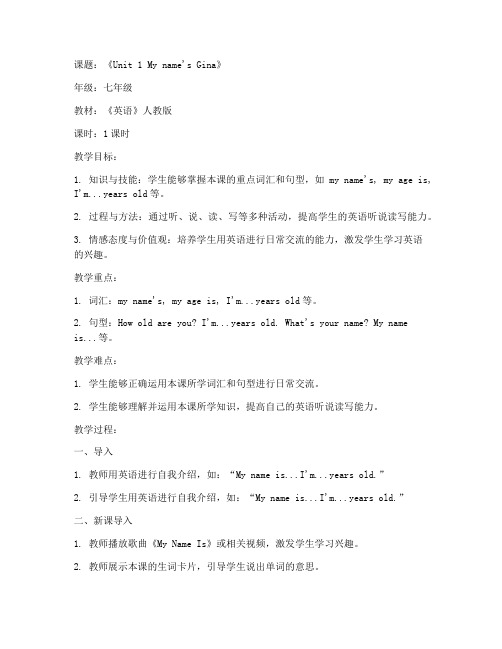
课题:《Unit 1 My name's Gina》年级:七年级教材:《英语》人教版课时:1课时教学目标:1. 知识与技能:学生能够掌握本课的重点词汇和句型,如my name's, my age is, I'm...years old等。
2. 过程与方法:通过听、说、读、写等多种活动,提高学生的英语听说读写能力。
3. 情感态度与价值观:培养学生用英语进行日常交流的能力,激发学生学习英语的兴趣。
教学重点:1. 词汇:my name's, my age is, I'm...years old等。
2. 句型:How old are you? I'm...years old. What's your name? My name is...等。
教学难点:1. 学生能够正确运用本课所学词汇和句型进行日常交流。
2. 学生能够理解并运用本课所学知识,提高自己的英语听说读写能力。
教学过程:一、导入1. 教师用英语进行自我介绍,如:“My name is...I'm...years old.”2. 引导学生用英语进行自我介绍,如:“My name is...I'm...years old.”二、新课导入1. 教师播放歌曲《My Name Is》或相关视频,激发学生学习兴趣。
2. 教师展示本课的生词卡片,引导学生说出单词的意思。
三、词汇教学1. 教师带领学生朗读生词,并讲解单词的用法和例句。
2. 学生跟读生词,并进行小组练习。
四、句型教学1. 教师展示句型卡片,引导学生说出句子的意思。
2. 教师带领学生朗读句子,并进行小组练习。
五、课文教学1. 教师播放课文录音,引导学生跟读课文。
2. 教师提问课文内容,检查学生对课文的理解。
六、课堂活动1. 学生进行角色扮演,模拟课文场景。
2. 学生进行小组讨论,分享自己的名字和年龄。
七、总结1. 教师对本课所学内容进行总结,强调重点词汇和句型。
初中英语无声试讲说课稿

初中英语无声试讲说课稿在进行初中英语无声试讲说课稿的编写时,我们需要注意以下几个要点:教学目标、教学内容、教学方法、教学过程、教学评价以及板书设计。
以下是一份初中英语无声试讲说课稿的示例:教学目标:1. 知识与技能:学生能够掌握本课的核心词汇和句型,能够正确使用这些词汇和句型进行基本的交流。
2. 过程与方法:通过小组合作学习和角色扮演活动,提高学生的英语口语表达能力和合作学习能力。
3. 情感态度与价值观:激发学生学习英语的兴趣,培养学生的跨文化交际意识。
教学内容:本课的主题是“Friendship”,学生将学习与友谊相关的词汇和表达方式,如“supportive”, “trustworthy”, “share”, “confide in”等。
教学方法:1. 情景教学法:通过设置与友谊相关的情境,让学生在实际语境中学习和使用语言。
2. 合作学习法:鼓励学生在小组内进行讨论和交流,共同完成学习任务。
3. 任务型教学法:设计一系列与主题相关的任务,引导学生在完成任务的过程中学习语言。
教学过程:1. 导入(Lead-in):通过展示一些关于友谊的图片或视频,激发学生对主题的兴趣,并引导学生谈论他们对友谊的看法。
2. 新课呈现(Presentation):介绍本课的核心词汇和句型,并通过例句和对话让学生理解其用法。
3. 操练(Practice):通过填空、连线、角色扮演等活动,让学生在实践中巩固所学知识。
4. 应用(Application):设计一个小组讨论或角色扮演任务,让学生运用所学的语言进行交流。
5. 总结(Summary):回顾本课的重点内容,并鼓励学生分享他们在学习过程中的收获和体会。
6. 作业(Homework):布置与主题相关的写作或口语作业,如写一篇关于友谊的短文或准备一个关于友谊的演讲。
教学评价:1. 过程评价:观察学生在小组讨论和角色扮演中的表现,给予及时的反馈和指导。
2. 结果评价:通过作业和口语测试来评估学生对本课内容的掌握情况。
初中英语无生试讲教案
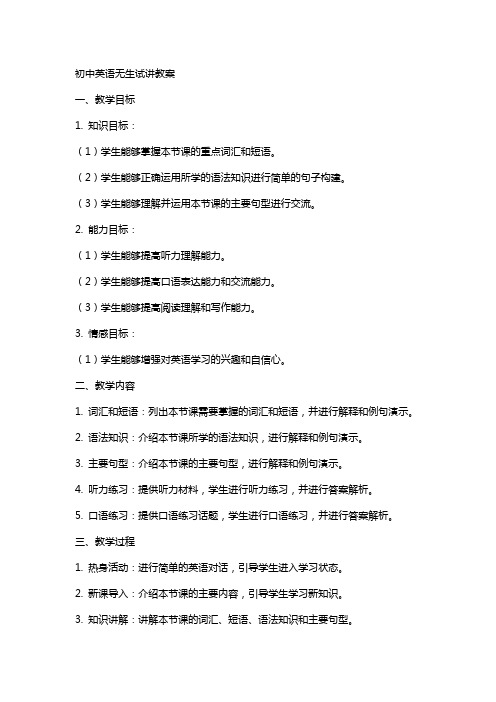
初中英语无生试讲教案一、教学目标1. 知识目标:(1)学生能够掌握本节课的重点词汇和短语。
(2)学生能够正确运用所学的语法知识进行简单的句子构建。
(3)学生能够理解并运用本节课的主要句型进行交流。
2. 能力目标:(1)学生能够提高听力理解能力。
(2)学生能够提高口语表达能力和交流能力。
(3)学生能够提高阅读理解和写作能力。
3. 情感目标:(1)学生能够增强对英语学习的兴趣和自信心。
二、教学内容1. 词汇和短语:列出本节课需要掌握的词汇和短语,并进行解释和例句演示。
2. 语法知识:介绍本节课所学的语法知识,进行解释和例句演示。
3. 主要句型:介绍本节课的主要句型,进行解释和例句演示。
4. 听力练习:提供听力材料,学生进行听力练习,并进行答案解析。
5. 口语练习:提供口语练习话题,学生进行口语练习,并进行答案解析。
三、教学过程1. 热身活动:进行简单的英语对话,引导学生进入学习状态。
2. 新课导入:介绍本节课的主要内容,引导学生学习新知识。
3. 知识讲解:讲解本节课的词汇、短语、语法知识和主要句型。
4. 听力练习:播放听力材料,学生进行听力练习,并提供答案解析。
5. 口语练习:提供口语练习话题,学生进行口语练习,并提供答案解析。
6. 阅读理解:提供阅读材料,学生进行阅读理解练习,并提供答案解析。
7. 写作练习:提供写作题目,学生进行写作练习,并提供答案解析。
8. 总结和复习:对本节课的内容进行总结和复习,巩固学生的学习成果。
四、教学评价1. 课堂参与度:观察学生在课堂上的参与程度,包括发言、讨论等。
2. 作业完成情况:检查学生完成作业的情况,包括正确性和及时性。
3. 测试成绩:进行小测试,评估学生的学习效果。
4. 口语表达和交流能力:观察学生在口语练习中的表现,评估其口语表达和交流能力。
5. 阅读理解和写作能力:观察学生在阅读理解和写作练习中的表现,评估其阅读理解和写作能力。
五、教学资源1. 教材:使用初中英语教材,提供相关章节的内容。
初中英语无生试讲教案模板
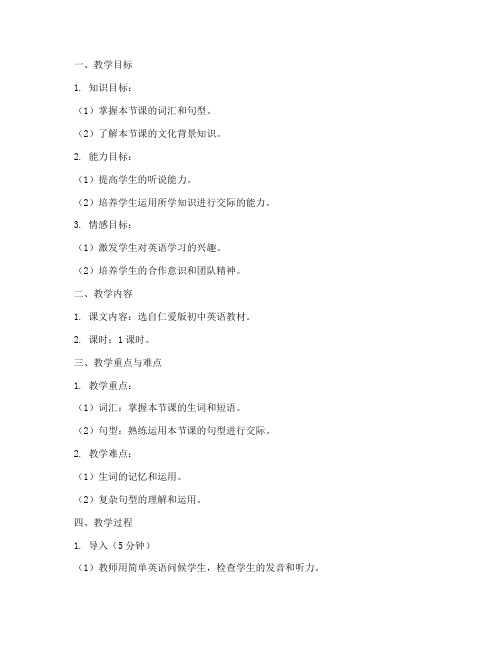
一、教学目标1. 知识目标:(1)掌握本节课的词汇和句型。
(2)了解本节课的文化背景知识。
2. 能力目标:(1)提高学生的听说能力。
(2)培养学生运用所学知识进行交际的能力。
3. 情感目标:(1)激发学生对英语学习的兴趣。
(2)培养学生的合作意识和团队精神。
二、教学内容1. 课文内容:选自仁爱版初中英语教材。
2. 课时:1课时。
三、教学重点与难点1. 教学重点:(1)词汇:掌握本节课的生词和短语。
(2)句型:熟练运用本节课的句型进行交际。
2. 教学难点:(1)生词的记忆和运用。
(2)复杂句型的理解和运用。
四、教学过程1. 导入(5分钟)(1)教师用简单英语问候学生,检查学生的发音和听力。
(2)展示图片或视频,引入本节课的主题。
2. 新课导入(10分钟)(1)教师展示课文图片,引导学生观察并描述图片内容。
(2)教师提问,检查学生对课文背景知识的了解。
3. 词汇学习(15分钟)(1)教师板书生词,引导学生拼读和记忆。
(2)教师用例句解释生词的含义,让学生模仿并练习。
(3)学生分组进行词汇接龙游戏,巩固生词。
4. 句型学习(15分钟)(1)教师展示例句,引导学生分析句型结构。
(2)学生跟读并模仿例句,练习句型。
(3)学生分组进行对话练习,运用句型进行交际。
5. 课文学习(15分钟)(1)教师播放课文录音,学生跟读并理解课文内容。
(2)教师提问,检查学生对课文的理解。
(3)学生分组进行角色扮演,运用课文内容进行交际。
6. 课堂小结(5分钟)(1)教师总结本节课的学习内容。
(2)学生分享自己的学习心得。
7. 作业布置(3分钟)(1)复习本节课的生词和句型。
(2)预习下一节课的内容。
五、教学评价1. 课堂表现:观察学生在课堂上的参与度、合作意识、表达能力等。
2. 作业完成情况:检查学生对本节课内容的掌握程度。
六、教学反思1. 教师在教学中要关注学生的个体差异,因材施教。
2. 教师要善于运用多种教学方法,激发学生的学习兴趣。
初中英语无生试讲教案
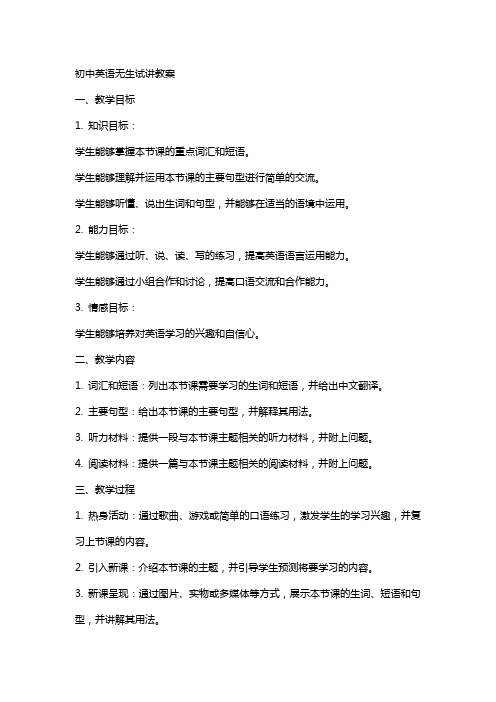
初中英语无生试讲教案一、教学目标1. 知识目标:学生能够掌握本节课的重点词汇和短语。
学生能够理解并运用本节课的主要句型进行简单的交流。
学生能够听懂、说出生词和句型,并能够在适当的语境中运用。
2. 能力目标:学生能够通过听、说、读、写的练习,提高英语语言运用能力。
学生能够通过小组合作和讨论,提高口语交流和合作能力。
3. 情感目标:学生能够培养对英语学习的兴趣和自信心。
二、教学内容1. 词汇和短语:列出本节课需要学习的生词和短语,并给出中文翻译。
2. 主要句型:给出本节课的主要句型,并解释其用法。
3. 听力材料:提供一段与本节课主题相关的听力材料,并附上问题。
4. 阅读材料:提供一篇与本节课主题相关的阅读材料,并附上问题。
三、教学过程1. 热身活动:通过歌曲、游戏或简单的口语练习,激发学生的学习兴趣,并复习上节课的内容。
2. 引入新课:介绍本节课的主题,并引导学生预测将要学习的内容。
3. 新课呈现:通过图片、实物或多媒体等方式,展示本节课的生词、短语和句型,并讲解其用法。
4. 练习活动:通过听力材料、阅读材料或小组讨论等方式,让学生实践运用本节课所学的内容。
5. 巩固活动:通过小测验、游戏或口语练习等方式,巩固学生对本节课知识的理解和运用。
四、教学资源1. 教材:使用初中英语教材,如人教版《英语》八年级上册。
2. 多媒体设备:电脑、投影仪、音响等。
3. 教学卡片:生词卡片、短语卡片、句型卡片等。
4. 听力材料和阅读材料:与本节课主题相关的听力材料和阅读材料。
五、教学评价1. 课堂参与度:观察学生在课堂活动中的参与程度,是否积极发言、参与小组讨论等。
2. 作业完成情况:检查学生完成作业的质量,包括拼写、语法、表达等方面。
3. 口语表达:评估学生在口语练习中的表达准确性、流利程度和语音语调等方面。
4. 小测验成绩:对学生的知识掌握情况进行评估,包括词汇、句型和听力理解等方面。
六、教学策略1. 任务型教学法:通过设计各种实际的交际任务,让学生在完成任务的过程中自然地学习和使用英语。
初中英语无生试讲教案
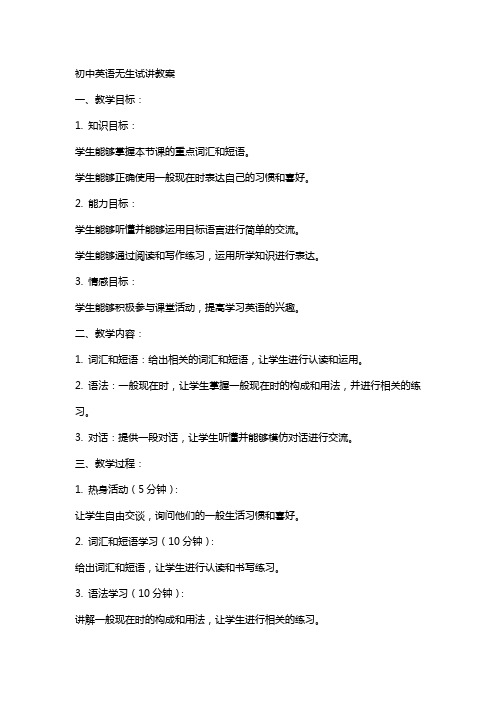
初中英语无生试讲教案一、教学目标:1. 知识目标:学生能够掌握本节课的重点词汇和短语。
学生能够正确使用一般现在时表达自己的习惯和喜好。
2. 能力目标:学生能够听懂并能够运用目标语言进行简单的交流。
学生能够通过阅读和写作练习,运用所学知识进行表达。
3. 情感目标:学生能够积极参与课堂活动,提高学习英语的兴趣。
二、教学内容:1. 词汇和短语:给出相关的词汇和短语,让学生进行认读和运用。
2. 语法:一般现在时,让学生掌握一般现在时的构成和用法,并进行相关的练习。
3. 对话:提供一段对话,让学生听懂并能够模仿对话进行交流。
三、教学过程:1. 热身活动(5分钟):让学生自由交谈,询问他们的一般生活习惯和喜好。
2. 词汇和短语学习(10分钟):给出词汇和短语,让学生进行认读和书写练习。
3. 语法学习(10分钟):讲解一般现在时的构成和用法,让学生进行相关的练习。
4. 对话学习(10分钟):播放对话,让学生听懂并能够模仿对话进行交流。
四、作业布置:1. 抄写词汇和短语。
2. 完成语法练习题。
3. 准备对话的角色扮演。
五、教学反思:在课后,对本次课程的教学效果进行反思,看是否达到了教学目标,学生是否掌握了重点知识,以及是否有需要改进的地方。
六、教学评价:1. 课堂参与度:观察学生在课堂活动中的参与程度,是否积极发言和互动。
2. 作业完成情况:检查学生作业的完成质量,是否正确掌握了词汇、短语和语法知识。
3. 对话表演:评估学生在对话表演中的语言表达能力和合作能力。
七、教学资源:1. 词汇和短语卡片:用于展示和学习词汇和短语。
2. 语法练习册:提供相关的练习题,帮助学生巩固语法知识。
3. 对话音频:用于播放对话,让学生听懂并模仿交流。
八、教学策略:1. 任务型教学法:通过小组合作和角色扮演等任务,激发学生的积极参与和合作精神。
2. 情境教学法:通过设定情境,让学生在实际语境中学习和运用英语。
3. 交互式教学法:通过提问、回答和讨论等方式,促进学生与教师和其他学生的互动交流。
初中英语无生试讲教案
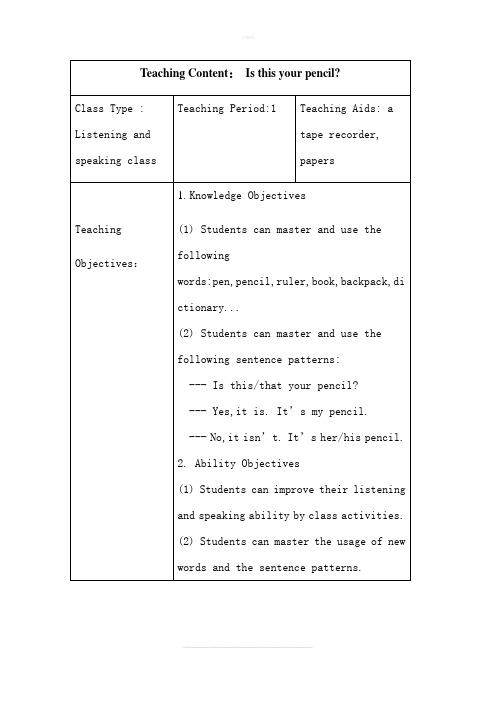
Teaching Key Points:
Students can use the new words and sentence patternscorrectly.
1.Knowledge Objectives
(1) Students can master and use the following words:pen,pencil,ruler,book,backpack,dictionary...
(2) Students can master and use the following sentence patterns:
pen Is this/that your pencil?
pencil Yes,it is. It’s my pencil. G1
book No,it isn’t. It’s her/his pencil. G2
ruler
Teaching Reflection:
. .
Teaching Difficult Points:
How to apply the new words and sentence patterns into practice and talk about school things.
Teaching Methods:
Asking questions, Communication Teaching Method, Task-based Teaching Method
(2) Students can master the usage of new words and the sentence patterns.
初中英语无生试讲教案
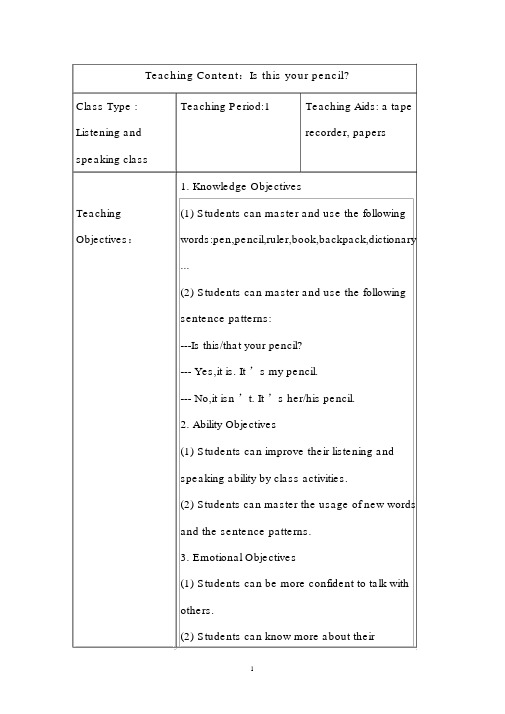
Teaching Content:Is this your pencil?Class Type :Teaching Period:1Teaching Aids: a tape Listening and recorder, papers speaking class1. Knowledge ObjectivesTeaching(1) Students can master and use the following Objectives:words:pen,pencil,ruler,book,backpack,dictionary...(2)Students can master and use the followingsentence patterns:---Is this/that your pencil?--- Yes,it is. It ’s my pencil.--- No,it isn ’t. It ’s her/his pencil.2. Ability Objectives(1)Students can improve their listening andspeaking ability by class activities.(2)Students can master the usage of new wordsand the sentence patterns.3. Emotional Objectives(1)Students can be more confident to talk withothers.(2)Students can know more about theirclassmates’belongs through the conversations.Teaching Key Students can use the new words and sentence Points:patterns correctly.Teaching Difficult How to apply the new words and sentence Points:patterns into practice and talk about schoolthings.: Asking questions, Communication Teaching Teaching MethodsMethod, Task-based Teaching Method Learning Methods:Cooperative learning methodLead-inTeaching(1)Sing a season song together. Procedures:(2)Devide students into 2 groups.(3)Ask one student to introduce some schoolthings.Presentation(1) Let students to describe what’s in thepicture and then match the words with thethings in excercise 1a.(2) Draw a school thing and ask students to(3)Invite some students to draw a schoolthing and other students guess.Practice(1)Play a guess game: Lost and found case.(2)Do some listening in excercise 1b.Consolidation(1) Let students practice the conversations inexcercise 1b and then make their ownconversations.(2)Invite some pairs of students to presenttheir conversations to the class.Summary and Homework(1)Make a short summary.(2)Ask students to search for more words andshare with their partners.Blackboard Design:Is this your pencil?pen Is this/that your pencil?pencil Yes,it is. It’s my pencil.G1book No,it isn ’t. It’s her/his pencil.G2ruler(3)Invite some students to draw a schoolthing and other students guess.Practice(1)Play a guess game: Lost and found case.(2)Do some listening in excercise 1b.Consolidation(1) Let students practice the conversations inexcercise 1b and then make their ownconversations.(2)Invite some pairs of students to presenttheir conversations to the class.Summary and Homework(1)Make a short summary.(2)Ask students to search for more words andshare with their partners.Blackboard Design:Is this your pencil?pen Is this/that your pencil?pencil Yes,it is. It’s my pencil.G1book No,it isn ’t. It’s her/his pencil.G2ruler。
初中英语无生试讲教案文件.doc
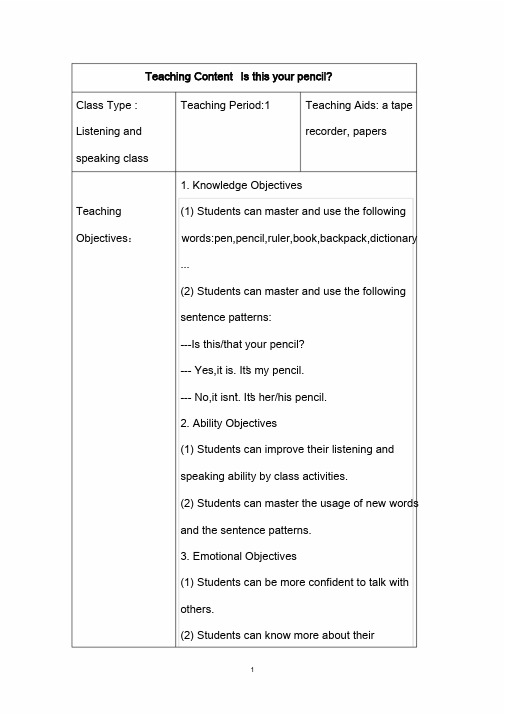
Teaching Conten:t Is this your pencil?Class Type : Teaching Period:1 Teaching Aids: a tape Listening and recorder, papers speaking class1. Knowledge ObjectivesTeaching (1) Students can master and use the following Objectives:words:pen,pencil,ruler,book,backpack,dictionary...(2) Students can master and use the followingsentence patterns:---Is this/that your pencil?--- Yes,it is. It’s my pencil.--- No,it isn’t. It’s her/his pencil.2. Ability Objectives(1) Students can improve their listening andspeaking ability by class activities.(2) Students can master the usage of new wordsand the sentence patterns.3. Emotional Objectives(1) Students can be more confident to talk withothers.(2) Students can know more about theirclassmates’b elongs through the conversations.Teaching Key Students can use the new words and sentence Points: patterns correctly.Teaching Difficult How to apply the new words and sentence Points: patterns into practice and talk about schoolthings.Teaching Methods:Asking questions, Communication TeachingMethod, Task-based Teaching Method Learning Methods: Cooperative learning methodLead-inTeaching (1) Sing a season song together. Procedures: (2) Devide students into 2 groups.(3) Ask one student to introduce some schoolthings.Presentation(1) Let students to describe wha’t s in the pictureand then match the words with the things inexcercise 1a.(2) Draw a school thing and ask students toguess, lead in the sentence patterns.(3) Invite some students to draw a school thingand other students guess.Practice(1) Play a guess game: Lost and found case.(2) Do some listening in excercise 1b.Consolidation(1) Let students practice the conversations inexcercise 1b and then make their ownconversations.(2) Invite some pairs of students to present theirconversations to the class.Summary and Homework(1) Make a short summary.(2) Ask students to search for more words andshare with their partners.Blackboard Design:Is this your pencil?pen Is this/that your pencil?pencil Yes,it is. It’s my pencil. G1book No,it isn’t. It’s her/his pencil. G2rulerReflection:。
初中英语无声讲课教案模板
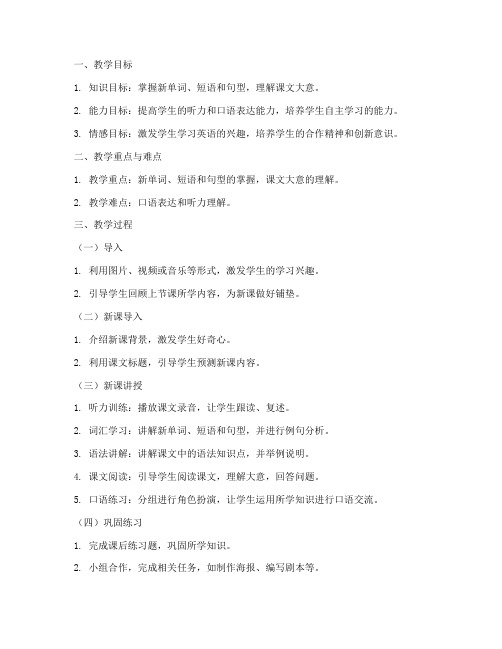
一、教学目标1. 知识目标:掌握新单词、短语和句型,理解课文大意。
2. 能力目标:提高学生的听力和口语表达能力,培养学生自主学习的能力。
3. 情感目标:激发学生学习英语的兴趣,培养学生的合作精神和创新意识。
二、教学重点与难点1. 教学重点:新单词、短语和句型的掌握,课文大意的理解。
2. 教学难点:口语表达和听力理解。
三、教学过程(一)导入1. 利用图片、视频或音乐等形式,激发学生的学习兴趣。
2. 引导学生回顾上节课所学内容,为新课做好铺垫。
(二)新课导入1. 介绍新课背景,激发学生好奇心。
2. 利用课文标题,引导学生预测新课内容。
(三)新课讲授1. 听力训练:播放课文录音,让学生跟读、复述。
2. 词汇学习:讲解新单词、短语和句型,并进行例句分析。
3. 语法讲解:讲解课文中的语法知识点,并举例说明。
4. 课文阅读:引导学生阅读课文,理解大意,回答问题。
5. 口语练习:分组进行角色扮演,让学生运用所学知识进行口语交流。
(四)巩固练习1. 完成课后练习题,巩固所学知识。
2. 小组合作,完成相关任务,如制作海报、编写剧本等。
(五)课堂小结1. 回顾本节课所学内容,总结重点和难点。
2. 鼓励学生提出疑问,教师进行解答。
(六)课后作业1. 复习课文,完成课后练习题。
2. 预习下一节课内容,提前预习相关单词和短语。
四、教学评价1. 课堂表现:观察学生在课堂上的参与程度、口语表达能力等。
2. 课后作业:检查学生课后作业的完成情况,了解学生的学习效果。
3. 课堂测试:定期进行课堂测试,评估学生的学习成果。
五、教学反思1. 教师在授课过程中,要注意引导学生积极参与,培养学生的自主学习能力。
2. 课堂活动要丰富多样,提高学生的学习兴趣。
3. 注重培养学生的口语表达能力和听力理解能力,提高学生的英语综合运用能力。
4. 及时总结教学过程中的优点和不足,不断改进教学方法。
初中英语无生试讲教案

Cooperative learning method
Teaching Procedures:
Lead-in
(1) Sing a season song together.
(2) Devide students into 2 groups.
(3) Ask one student to introduce some school things.
Teaching Difficult Points:
How to apply the new words and sentence patterns into practice and talk about school things.
Teaching Methods:
Asking questions, Communication Teaching Method, Task-based Teaching Method
1.Knowledge Objectives
(1) Students can master and use the following words:pen,pencil,ruler,book,backpack,dictionary...
(2) Students can master and use the following sentence patterns:
---Is this/that your pencil?
---Yes,it is. It’s my pencil.
---No,it isn’t. It’s her/his pencil.
2. Ability Objectives
(1) Students can improve their listening and speaking ability by class activities.
初中英语无生试讲教案
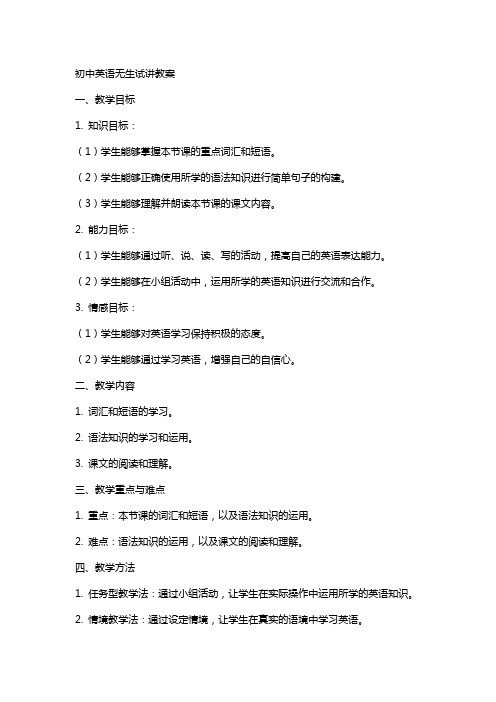
初中英语无生试讲教案一、教学目标1. 知识目标:(1)学生能够掌握本节课的重点词汇和短语。
(2)学生能够正确使用所学的语法知识进行简单句子的构建。
(3)学生能够理解并朗读本节课的课文内容。
2. 能力目标:(1)学生能够通过听、说、读、写的活动,提高自己的英语表达能力。
(2)学生能够在小组活动中,运用所学的英语知识进行交流和合作。
3. 情感目标:(1)学生能够对英语学习保持积极的态度。
(2)学生能够通过学习英语,增强自己的自信心。
二、教学内容1. 词汇和短语的学习。
2. 语法知识的学习和运用。
3. 课文的阅读和理解。
三、教学重点与难点1. 重点:本节课的词汇和短语,以及语法知识的运用。
2. 难点:语法知识的运用,以及课文的阅读和理解。
四、教学方法1. 任务型教学法:通过小组活动,让学生在实际操作中运用所学的英语知识。
2. 情境教学法:通过设定情境,让学生在真实的语境中学习英语。
五、教学步骤1. 热身活动:学生听一首英文歌曲,跟唱并模仿发音。
2. 引入新课:教师展示本节课的主题,引导学生思考相关问题。
3. 新课教学:教师讲解本节课的词汇和短语,引导学生进行实际操作。
4. 语法知识的学习:教师讲解本节课的语法知识,引导学生进行实际操作。
5. 课文学习:学生阅读课文,理解课文内容,教师进行讲解和解答疑问。
6. 小组活动:学生分组进行任务型活动,运用所学的英语知识进行交流和合作。
7. 总结与反馈:教师对学生的学习情况进行总结和反馈,学生进行自我评价。
六、教学评价1. 评价方式:采用形成性评价和终结性评价相结合的方式,对学生的学习情况进行全面评价。
2. 评价内容:学生的词汇、语法知识掌握情况,课文的阅读理解能力,以及小组活动中的合作交流能力。
3. 评价标准:根据学生的课堂表现、作业完成情况、考试成绩等方面进行评价。
七、作业布置1. 抄写本节课学习的词汇和短语,并造句。
2. 完成课后练习题,巩固所学的语法知识。
初中英语无生上课教案模板

一、教学目标1. 知识目标:(1)学生能够掌握本节课的核心词汇和句型。
(2)学生能够运用所学词汇和句型进行简单的对话和写作。
2. 能力目标:(1)提高学生的听说读写能力。
(2)培养学生运用英语进行思维的能力。
3. 情感目标:(1)激发学生学习英语的兴趣。
(2)培养学生的跨文化交际意识。
二、教学内容1. 课文内容:选取一篇适合初中生水平的英语课文。
2. 词汇:课文中的核心词汇。
3. 句型:课文中的典型句型。
三、教学过程1. 导入(1)通过图片、视频或音乐等形式,激发学生的学习兴趣。
(2)引导学生回顾已学知识,为新课做铺垫。
2. 预习检测(1)检查学生对课文生词的掌握情况。
(2)检查学生对课文句型的理解程度。
3. 课文讲解(1)讲解课文中的生词和句型,并进行适当的例句演示。
(2)分析课文结构,引导学生理解课文内容。
(3)通过提问、讨论等方式,让学生积极参与课堂活动。
4. 课堂活动(1)分组讨论:让学生分组讨论课文中的问题,培养学生的合作能力。
(2)角色扮演:让学生分组进行角色扮演,提高学生的口语表达能力。
(3)游戏活动:设计一些与课文内容相关的游戏,让学生在轻松愉快的氛围中学习。
5. 课堂小结(1)回顾本节课所学内容,总结重点词汇和句型。
(2)布置课后作业,巩固所学知识。
6. 布置作业(1)完成课后练习题,巩固所学知识。
(2)预习下一节课的内容。
四、教学评价1. 课堂表现:观察学生在课堂上的参与程度、口语表达能力、合作意识等。
2. 作业完成情况:检查学生课后作业的完成质量,了解学生对知识的掌握程度。
五、教学反思1. 教学过程中,注意关注学生的学习需求,调整教学策略。
2. 课后及时总结教学效果,为下一节课做好准备。
以下为具体教学案例:教学案例:《My Family》一、教学目标1. 知识目标:(1)学生能够掌握家庭成员的英文表达方式。
(2)学生能够运用所学词汇和句型介绍自己的家庭。
2. 能力目标:(1)提高学生的听说读写能力。
- 1、下载文档前请自行甄别文档内容的完整性,平台不提供额外的编辑、内容补充、找答案等附加服务。
- 2、"仅部分预览"的文档,不可在线预览部分如存在完整性等问题,可反馈申请退款(可完整预览的文档不适用该条件!)。
- 3、如文档侵犯您的权益,请联系客服反馈,我们会尽快为您处理(人工客服工作时间:9:00-18:30)。
Teaching Key Points:
Students can use the new words and sentence patternscorrectly.
---Is this/that your pencil?
---Yes,it is. It’s my pencil.
---No,it isn’t. It’s her/his pencil.
2. Ability Objectives
(1) Students can improve their listening and speaking ability by class activities.
Presentation
(1) Let students to describe what’s in the picture and then match the words with the things in excercise 1a.
(2) Draw a school thing and ask students to guess, lead in the sentence patterns.
Summary and Homework
(1) Make a short summary.
(2) Ask students to search for more words and share with their partners.
Blthis your pencil?
(3) Invite some students to draw a school thing and other students guess.
Practice
(1) Play a guess game: Lost and found case.
(2) Do some listening in excercise 1b.
Consolidation
(1)Let students practice the conversations in excercise 1b and then make their own conversations.
(2)Invite some pairs of students to present their conversations to the class.
(2) Students can master the usage of new words and the sentence patterns.
3. Emotional Objectives
(1) Students can be more confident to talkwith others.
Teaching Content:Is this your pencil?
Class Type : Listening and speaking class
Teaching Period:1
Teaching Aids: a tape recorder, papers
Teaching
Objectives:
1.Knowledge Objectives
(1) Students can master and use the following words:pen,pencil,ruler,book,backpack,dictionary...
(2) Students can master and use the following sentence patterns:
pen Is this/that your pencil?
pencil Yes,it is. It’s my pencil. G1
book No,it isn’t. It’s her/his pencil. G2
ruler
Teaching Reflection:
Learning Methods:
Cooperative learning method
Teaching Procedures:
Lead-in
(1) Sing a season song together.
(2) Devide students into 2 groups.
(3) Ask one student to introduce some school things.
Teaching Difficult Points:
How to apply the new words and sentence patterns into practice and talk about school things.
Teaching Methods:
Asking questions, Communication Teaching Method, Task-based Teaching Method
